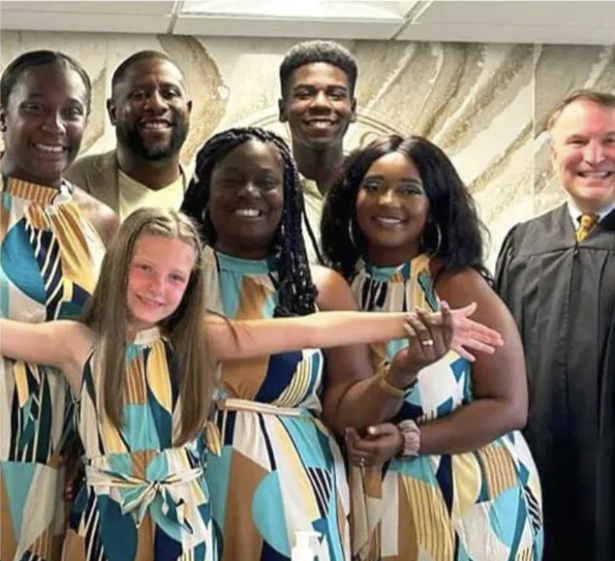
The courtroom in Texas was filled with nearly eighty people, all gathered for a moment six years in the making. Lily stood at the center of it all, flanked by the Hill family—the people who had been her foster parents, her protectors, her safe place through years of uncertainty. And now, finally, they were about to become something more permanent. Something she’d dreamed about every night since she first walked through their door.
Six years is a long time to wait for forever. Six years of hoping, of wondering if this time would be different, of building a life with people you love while never quite knowing if you’d get to keep it. Foster care is full of goodbyes. Full of temporary placements and changed plans and adults who promise they’ll stay but don’t. Lily had learned not to expect too much.
But the Hills were different. They didn’t see Lily as a temporary responsibility or a good deed to check off a list. They saw her as their daughter. And today, in front of friends, family, and a judge who’d witnessed too many foster cases end differently, it became official.
When the gavel came down, Lily got what she’d always dreamed of: a forever family and a last name to call her own. Not a placement. Not a case file. A daughter. A sister. A Hill.
Her new father, Nate, spoke through tears. “They got to see God reign today.” His voice cracked with the weight of what those words meant—not just the legal formality of adoption, but the spiritual and emotional reality of a child finally finding home.
Her mother, Lakenya, added something equally profound: “She has changed everything about me.” Because that’s what love does. It doesn’t just save the person being loved—it transforms the one doing the loving. Lily didn’t just gain a family. The Hills gained a daughter who taught them about resilience, about hope, about what it means to choose love even when it’s hard.
The photo shows them all together—Lily and her new siblings, the Hill family complete, dressed in matching patterns that signal unity, belonging, the visual language of family. Lily’s smile is radiant. She’s holding onto her new mother, anchored by the arms that chose her.
This is the image that often gets left out of conversations about race and adoption. We talk about color in abstract terms, debate policies and programs, argue about who should raise whom. But the Hills didn’t wait for perfect circumstances or worry about what others might think. They saw a child who needed love, and they gave it. They proved that family has no color—only commitment.
There are thousands of children in foster care right now, waiting for what Lily finally received. Waiting for someone to see them not as a statistic or a challenge, but as a person worthy of permanence. Waiting for a family that will show up to court with eighty friends to celebrate the moment their last name changes.
Adoption isn’t just about paperwork. It’s about belonging. It’s about a child who spent years wondering if anyone would choose her, finally learning that yes, someone did. Someone will. Someone already has.
In a Texas courtroom, surrounded by people who loved her, Lily learned that waiting doesn’t last forever. That hope isn’t foolish. That families are built not just by biology but by the choices we make every single day to stay, to love, to claim each other as our own.
She finally has a last name to call her own. And the Hills have a daughter who has changed everything about them.
That’s what family does. It chooses you. And it changes you. Forever.